Eating sea moss during pregnancy is one of those strange cravings that pregnant women have.
And even though health experts do not suggest eating anything that comes from the sea while pregnant (due to iodine and heavy metals), if you’re wondering if sea moss is safe during pregnancy, the answer is yes. It is!
So what do we know about sea moss (now that we’re diving into the “Can you eat sea moss during pregnancy” topic)?
It represents the sort of seaweed and algae also known as Chondrus crispus. It can be defined as a spiny-edible plant that can be found in seawater on rocks and tide pools, mostly in northern regions of the Atlantic Ocean.
So, yes, you can eat sea moss while pregnant due to its various benefits. It is a very nutritive food, plus a great topical solution.
I’ll discuss all of this further in the article, so let’s dive into this topic (can you eat sea moss during pregnancy) right now to uncover interesting things about this algae.
Is Sea Moss Safe during Pregnancy?
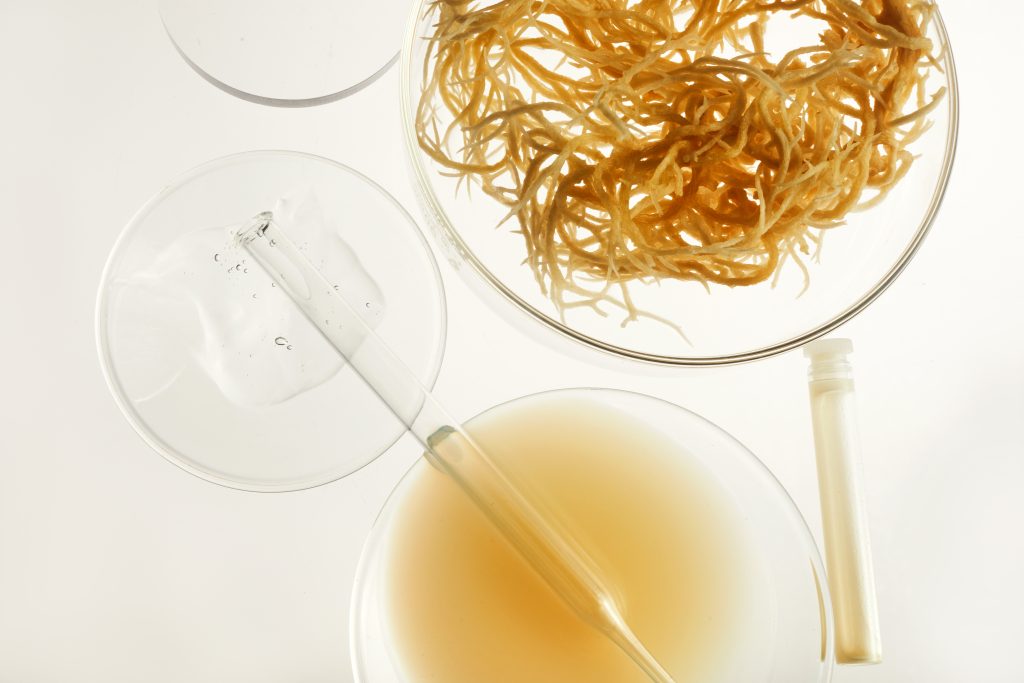
A lot of pregnant ladies are wondering if sea moss is safe during pregnancy because it does contain a certain amount of mercury.
Although that’s true, sea moss is safe during pregnancy because these levels are not too high.
Surprisingly (now that we determined that sea moss is safe during pregnancy) one can of tuna contains more mercury than sea moss!
Eating sea moss while pregnant is actually very beneficial (referring to the darker purple mosses) because it is packed with anthocyanins.
What are anthocyanins?
Namely, these are compounds within the purple hue that are actually anti-inflammatory.
This just goes to show that consuming sea moss while pregnant (and even if you aren’t) is really good for you, particularly if you’re suffering from any health condition that causes inflammation in your body.
And then, there’s another sort of seaweed, known as bladderwrack, but there isn’t enough information to confirm if it is safe to eat sea moss during pregnancy (referring to bladderwrack), which is why you should steer clear of it.
And this includes women who are breastfeeding as well!
Sea Moss Is Safe During Pregnancy Due to Its Nutritional Benefits
If you are longing to eat sea moss during pregnancy, then you will nourish your body with nothing less than a superfood.
That’s precisely one of the reasons why sea moss is safe during pregnancy. According to the renowned website, 10 grams of sea moss (which is the same as 2 tablespoons) contains:
1. Calcium – 7.2 milligrams
2. Phosphorus – 15.7 milligrams
3. Magnesium – 14,4 milligrams
5. Potassium – 6.3 milligrams
6. Zinc – 0.2 milligrams
7. Copper – 0.2 milligrams
8. Manganese – 0.04 milligrams
9. Iron – 0.9 milligrams
They all support healthy life (which is why sea moss is safe during pregnancy) and help your body properly function.
For instance, Iron is required to produce red blood cells and carry oxygen around the body. And that’s extremely important because it is widely known that most pregnant women are susceptible to anemia.
On the other hand, we have potassium which is here to control the levels of electrolytes and fluids in your body, which is another crucial thing when you’re pregnant.
What about calcium?
It’s safe to say that it is even more essential during pregnancy. Unfortunately, most of these nutrients are used up quickly during pregnancy which is why it is of huge importance to have a healthy, balanced diet while pregnant and provide yourself with some high-quality supplements.
Another reason why sea moss is safe during pregnancy is that it is packed with vitamins too!
It contains both vitamin C and vitamin D and we all know how important both of them are, particularly vitamin C. It is highly beneficial for overall well-being, tooth health, and bone health.
Not consuming enough vitamin C is going to decrease your body’s ability to absorb iron properly. And on the flip side, we need vitamin D to help us absorb vitamin C the right way.
Sea moss during pregnancy is desirable because of all these aforementioned vitamins, however, keep in mind that it also has vitamin A and too much of it can potentially harm your unborn baby.
Therefore, you can consume sea moss during pregnancy, but just be sure you eat it moderately.
Different Sorts of Sea Moss
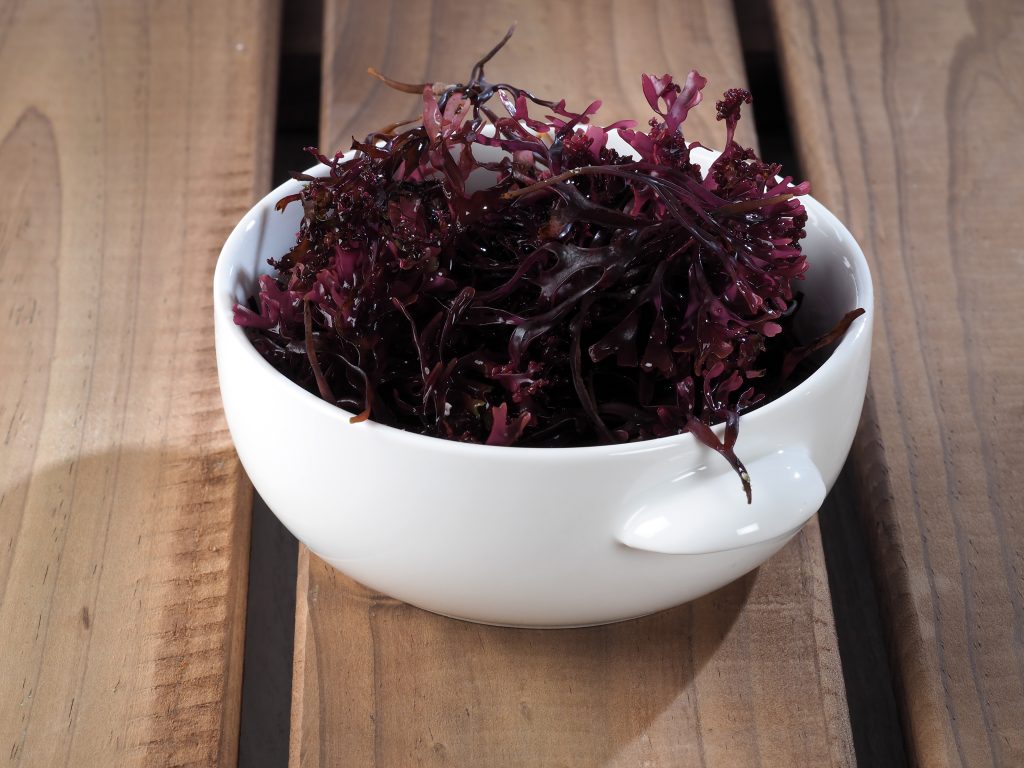
Even though you can eat sea moss during pregnancy, it can be confusing to many pregnant women to determine exactly which one since there are various varieties of it.
Some of them want to eat sea moss while pregnant but are not sure which sort is pregnancy-safe. But that’s why I am here (your little helper), to look after every pregnant woman.
Below, I’ll discuss some of the most famous and safest options out there to help you pick sea moss (which is rich in nutrients) while pregnant that is allowed.
Let’s introduce Bladderwrack (again) and Sea Moss. As previously stated (while I was launching the “Can I eat see moss during pregnancy” topic) Bladderwrack is also a seaweed.
Actually, a plethora of gels that can be found on the market contain both sea moss and bladderwrack. Although I did confirm that using sea moss while pregnant is not harmful, that cannot be guaranteed for this type of seaweed.
Thereby, it would be advisable to stay away from it while you’re pregnant.
Sea Moss Supplement VS Tablets
You do not frequently stumble upon pregnant women who are yearning to eat sea moss while pregnant because, to be honest, to them, that’s not the most appealing thing in the world. Most of them would rather binge on hot chocolate or any other delicious drink/food.
However, as I previously concluded, eating sea moss while pregnant is actually a good idea because it is rich in nutrients that support a healthy lifestyle.
So does it mean that you can consume sea moss while pregnant in the form of a supplement?
If you would like to purchase sea moss while pregnant in the form of a supplement, then you must be extra careful!
How come?
Well, that’s because not all supplements are pregnancy-safe, hence it’s of huge importance to first check the label and only purchase sea moss while pregnant from reputable and tested brands.
I would like to remind you that there are lots of seaweed supplements that have kelp and brown seaweed which can significantly increase the levels of iodine in your body which is not good for pregnant women.
Apart from that, sea moss-only supplements can also be loaded (apart from essential nutrients) with high levels of heavy metals, which are capable of piling up in the body over time.
So how can you use sea moss during pregnancy then?
If you want to prevent any inconveniences, then it would be recommendable to either stay away from supplemental sea moss during pregnancy or to at least use products only from eminent manufacturers and of course, to consume it in moderation.
Let’s Discuss Sea Moss Gel
Many pregnant women (including me) think that sea moss gels are intended for skin or hair. However, what may come as a surprise is the fact that most of them are actually nothing but food additives.
Namely, purple moss is actually oftentimes employed to create agar, which is a substance that is used to thicken sauces, and a lot of vegans use it as a gelatin substitute.
And then, you will run into beverages that were made from sea moss gel. If it’s made from pure sea moss, the gel is considered safe during pregnancy, however, (as suggested numerous times above) pay attention to the serving size.
And Sea Moss Drinks?
You can use sea moss during pregnancy in form of a drink too and make some delicious sea moss latte.
What’s interesting is the fact that when a particular drink is made with top-notch sea moss (that is proven to be real sea moss), then this beverage is not only safe but also a good way to spice up your morning drink.
So yes, you can have sea moss during pregnancy in the form of a beverage, but just make sure that you are consuming true sea moss!
Sea Moss Powder
There are people (this doesn’t refer to pregnant ladies only) who love to add the powder form of seaweed to their yogurt, smoothies, cereal, juices, and even some food. That’s because it effectively thickens their drink.
Risks of Consuming Sea Moss During Pregnancy

Yes, I know that both of us concluded that sea moss is safe during pregnancy (when we were talking about sea moss benefits). However, just like with most things, if you overconsume it, you increase the risk of experiencing some side effects.
But to stay safe during pregnancy, make sure to consult your doctor before you decide to add sea moss to your food.
So what are the risks?
Iodine Imbalance
Although there’s no denying that sea moss is an amazing source of iodine, it can still cause iodine imbalance which may result in some health issues, particularly during pregnancy.
So how much are you supposed to take?
The Harvard School of Public Health suggests having 220 micrograms of iodine (290 for breastfeeding moms) while pregnant.
On the other hand, if you aren’t, then you should be taking around 150 micrograms. Sea moss has around 47 milligrams of iodine per gram.
In addition, iodine plays a crucial part in thyroid function. Thyroid hormones positively impact bone and brain development.
However, if an iodine imbalance occurs, it may cause hypothyroidism. Contrastingly, too much of it can can lead to an enlarged thyroid gland or goiter.
There’s no need to remind you that low levels of iodine during pregnancy can seriously jeopardize your health and the health of your baby.
Manganese Overconsumption
Manganese can be defined as a trace mineral that aids in developing cartilage, connective tissue, bones, sex hormones, and blood clotting factors.
Through a balanced and healthy diet, you can get the required amounts of it. However, if you overconsume sea moss (this applies to pregnant women), you will have high levels of manganese, which isn’t recommendable.
Why is that?
Well, that’s because high levels of manganese (particularly during the second trimester) can increase the chances of preterm labor.
Folic Acid VS Folate
Folic acid is highly beneficial for the proper development of the unborn baby’s central nervous system. Apart from that folic acid prevent neural tube defects as well!
It is generally advisable to take at least 400 micrograms of folic acid every single day during pregnancy.
In fact, it would be even better if you took up to 1,000 micrograms of it.
Now, the next question is, how much folate does sea moss have?
It has roughly 18, micrograms of it per 2 tablespoons. So what is the main difference between these two?
Namely, folic acid represents the synthetic form of B9, while folate represents its natural form.
In the past, it has been proven that only folic acid can prevent neural defects, which wasn’t the case with folate.
Even though there’s no doubt that sea moss is very healthy and nutrient-rich, keep in mind that it must never serve as a substitute for prenatal vitamins if you want to maintain a healthy pregnancy.
However, you can always employ it simultaneously.
Too Much Vitamin A is Not Good!
No one can deny that Vitamin A is an essential nutrient since it positively impacts vision, immunity, cellular division, and fetal and skeletal development.
It can be found in a variety of natural supplements, such as dairy products, spinach, and liver.
What’s interesting is the fact that the human body is able to turn beta-carotene into vitamin A, and beta-carotene “resides” in food like carrots, green veggies, and cantaloupe which means that you can easily acquire all of them are rich in it.
Adult women are supposed to have 700 micrograms per day, while adult men should have 900 micrograms. Sea moss has around 0.6 micrograms per 2 tbsp.
Even though vitamin A is beneficial, don’t forget that if you overconsume it, it can result in numerous health problems, like liver damage, bone thinning, and even birth defects.
Furthermore, it has been concluded before that too much of it (referring to the first trimester) can potentially cause congenital malformations involving the cardiovascular and central nervous systems in the fetus.
Therefore, before you start taking vitamin A, be sure first to seek medical advice just to avoid overconsumption.
High Heavy Metal Levels
Sea moss (just like most sea life) is capable of absorbing heavy metals, like mercury from the ocean. And this extremely dangerous metal can pile up in the bloodstream and can directly affect your unborn baby.
And if (God forbid) something like this occurs, it can seriously impact their brain development and nervous system.
Moreover, it can affect their memory, language, cognitive thinking, visual-spatial skills, and fine motor skills.
Carrageenan
It appears to be that carrageenan has managed to confuse a lot of people because some think that it’s not harmful, and then there are those who claim that it can cause some serious side effects, like problems with the GI tract and inflammation.
According to those who are against it, it can also increase bleeding, slow blood clotting, and worsen bleeding disorders in some individuals.
If you want to maintain a healthy pregnancy, consume a type of seaweed that is pregnancy-safe, and eat it in moderation.
Sea Moss & Morning Sickness
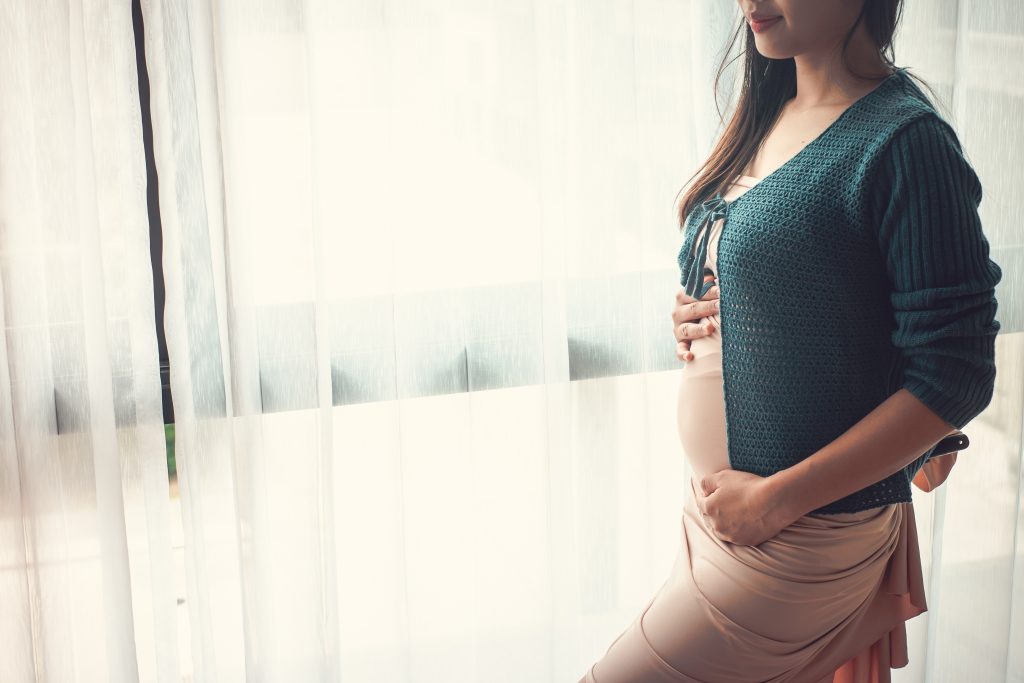
If there’s one thing that pregnant women hate it is for sure morning sickness. But unfortunately, a vast majority of pregnant ladies experience it on a regular basis.
Some of them have heard that having sea moss during pregnancy can actually decrease morning sickness, but is it really the case?
Even though that’s partially true (because there were some women who started feeling better after sea moss), the truth is, there isn’t any concrete evidence to guarantee one hundred percent that this is true.
What I do know is that vitamin B6 and Calcium are known to lower nausea and sea moss does contain both of them, however, not in huge amounts.
Consequently, if you notice that sea moss does make you feel better (when it comes to morning sickness), then by all means, keep consuming it, but it doesn’t necessarily mean that every pregnant lady will reap the benefits of it.
Conclusion
Pregnant women & sea moss, what an unusual “friendship”!
I won’t ask you why you suddenly woke up and demanded sea moss instead of prosciutto, for example; however, what I will tell you is that you can freely add it to your diet, but just be very cautious because you do not want something as weird as sea moss to negatively affect your overall well-being (and baby’s too).
If you come up with some tasty recipes (which I honestly doubt) that involve sea moss, please let me know because then I’ll maybe learn to love it.

Well, hello there!
My name is Jennifer. Besides being an orthodontist, I am a mother to 3 playful boys. In this motherhood journey, I can say I will never know everything. That’s why I always strive to read a lot, and that’s why I started writing about all the smithereens I came across so that you can have everything in one place! Enjoy and stay positive; you’ve got this!

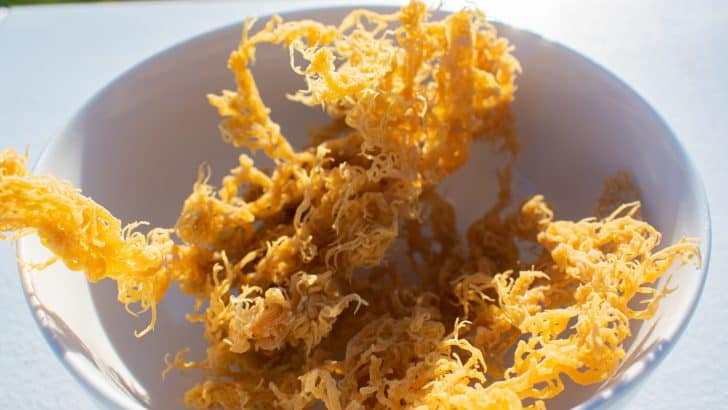
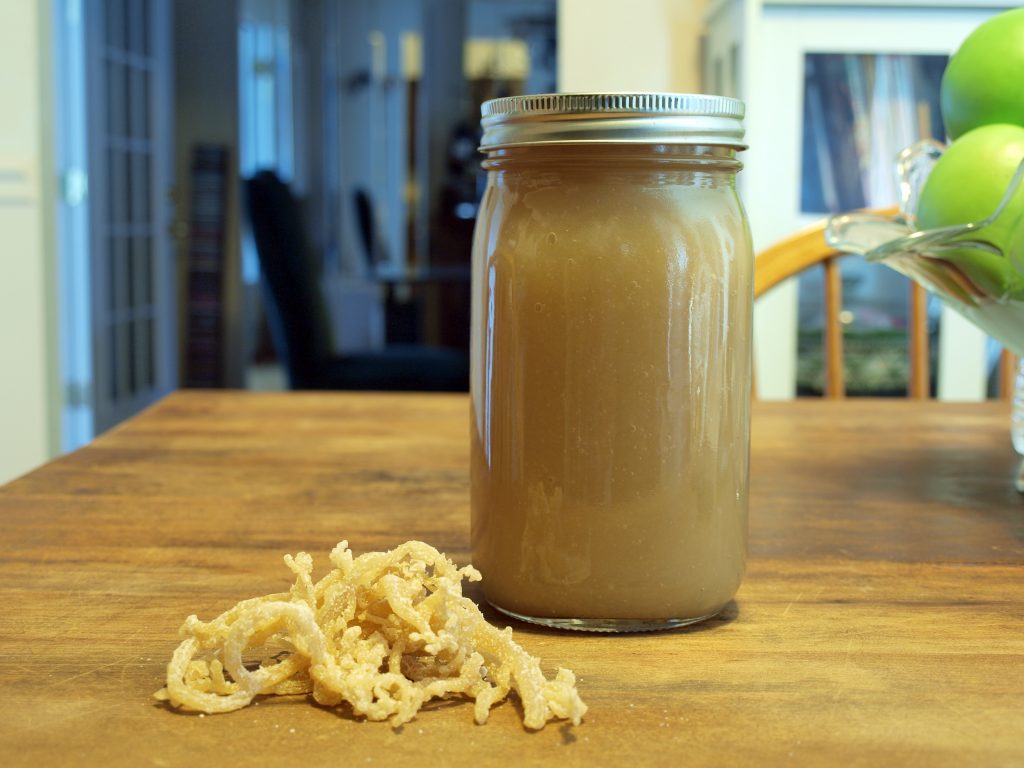
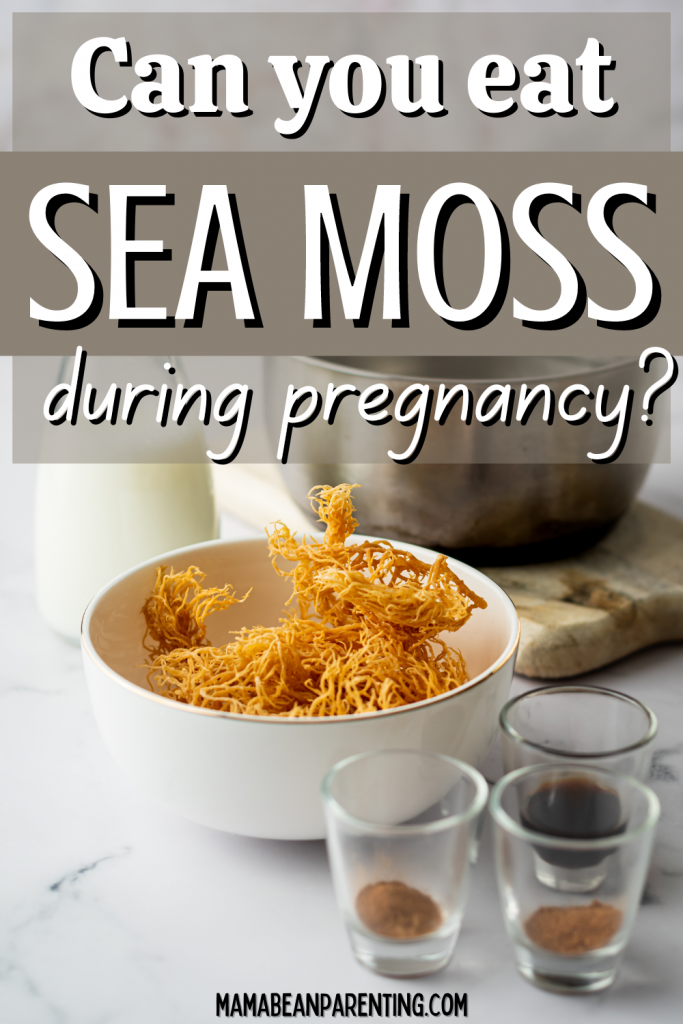
What Is the Best Pregnancy Cereal? • Mama Bean Parenting
Thursday 2nd of February 2023
[…] are different strange cravings (eating sea moss is one of them), but cereals are definitely not in that category because that’s something most people love to […]